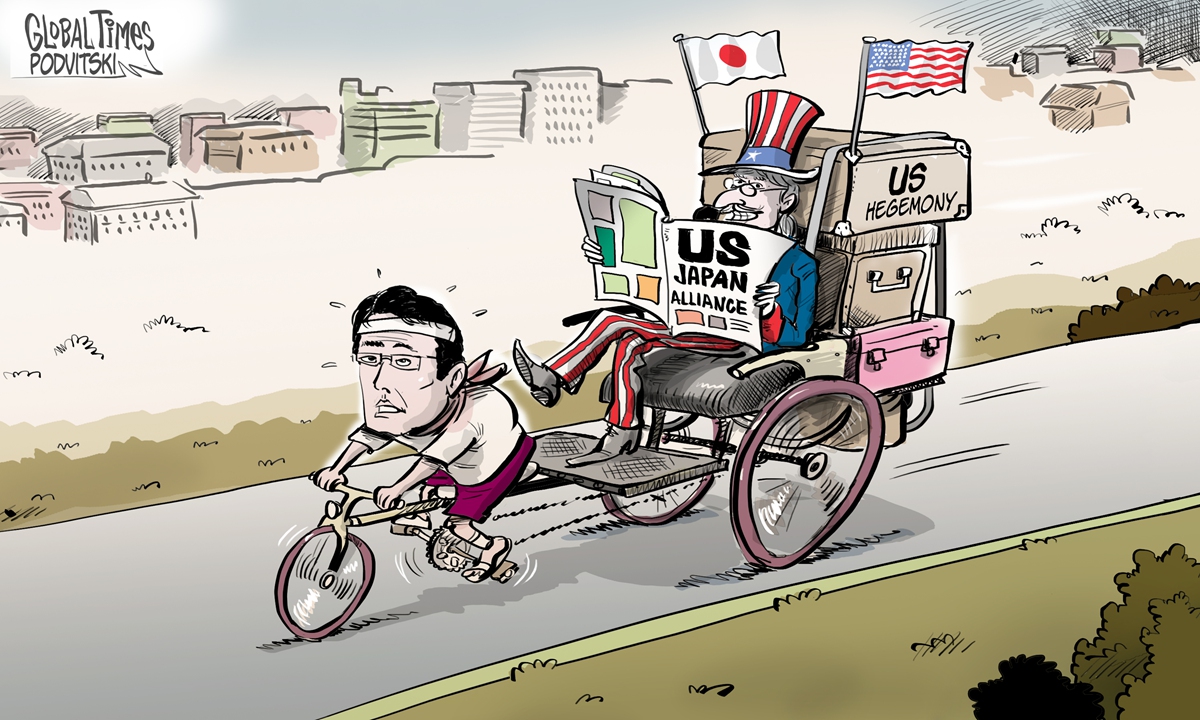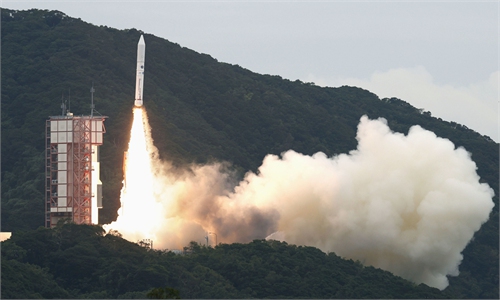
Well-trained pawn Illustration: Vitaly Podvitski
It's a worrying tendency that the revision of Japan's National Security Strategy is moving along the path of serving the US more in containing China. China has no intention of being hostile to Japan, but Japan is taking China as an imaginary enemy and making security policy guideline adjustment in an irrational way that provokes China. Hopefully Japan can stay sober and won't push itself into a gamble that it will eventually be unable to afford.A Japanese government source said Wednesday that Tokyo is planning to highlight diplomatic initiatives advocated by assassinated former prime minister Shinzo Abe, who is known for having proposed the security framework called the Quad, involving Australia, India, Japan and the US, and promoted a "free and open Indo-Pacific" to tackle China's regional influence, in Japan's long-term security policy guideline slated to be updated by the end of this year, according to Kyodo News. In the revised National Security Strategy (NSS), Tokyo reportedly will also mention that "no unilateral change of the status quo by force will be tolerated" regarding the Taiwan question.
It would be the first revision of the security and diplomacy policy guideline since it was adopted in 2013. Since the Japanese government decided to release a new NSS, all messages revealed around the revision have been disturbing. In April, a Liberal Democratic Party commission called for China to be described as a threat to Japan's security when the government revises defense documents at the end of this year, according to the Yomiuri Shimbun. "How China would be defined in the revised NSS deserves special attention," said Sun Wenzhu, associate research fellow of the Department for Asia-Pacific Studies, China Institute for International Studies.
Japanese Prime Minister Fumio Kishida hasn't offered any grand diplomatic or security initiatives since he assumed office, therefore, he can only inherit some of Abe's legacies and then seek development and breakthrough based on Abe-proposed frameworks. "Noticeably, the so-called free and open Indo-Pacific vision and Quad framework proposed by Abe are both policy propositions that take China as a potential target of containment," Wang Guangtao, an associate research fellow at the Center for Japanese Studies of the Shanghai-based Fudan University, told the Global Times. He noted if those policy designs are clearly referred to in the NSS, Japan will further tie itself, as an accomplice and petty follower of the US, to the chariot of the US to contain China.
Chinese analysts warned that if Japan revises the national strategy in a way that provokes China, it will further deteriorate the already cold China-Japan relations and cast a shadow on the future of bilateral ties.
Japan's intervention in the Taiwan question has been increasingly obvious for some time. Abe once said that an emergency concerning the Taiwan island would be one for Japan, which has almost become Japan's semi-official attitude toward the Taiwan question. "If Japan adds some tough statements related to Taiwan to its national security strategy, it will be challenging the red line of the one-China principle," Wang said. He further emphasized that facing Tokyo which is using a salami-slicing approach to constantly test the bottom line of China over the Taiwan question, China must make it clear that any provocations will be met with specific punitive measures.
An important prerequisite for the normalization of diplomatic relations between China and Japan is Japan's adherence to the one-China principle, which is the basis for all interactions between the two countries. "An important reason for the current problems in China-Japan relations is that some Japanese conservative politicians have begun to waver on the principle and want to play the Taiwan card to contain China. The long-term healthy development of China-Japan ties is severely harmed by this tendency," Sun said.
The Biden administration unveiled its long-awaited National Security Strategy on Wednesday, labeling China as the "most consequential geopolitical challenge." It's also reported that China is to be formally designated a "threat" to Britain when Liz Truss rewrites Boris Johnson's defense and foreign policy.
Japan is clearly following in the footsteps of the US and the UK. "Japan has a clear speculative mentality. It hopes to increase its influence and leadership in Asia by assisting the US in containing China," Sun said. However, experts say that the international community will only remember Japan as "America's accomplice."



